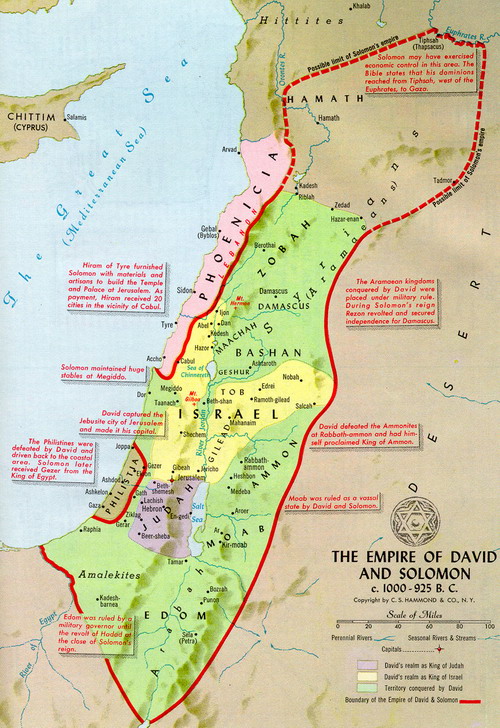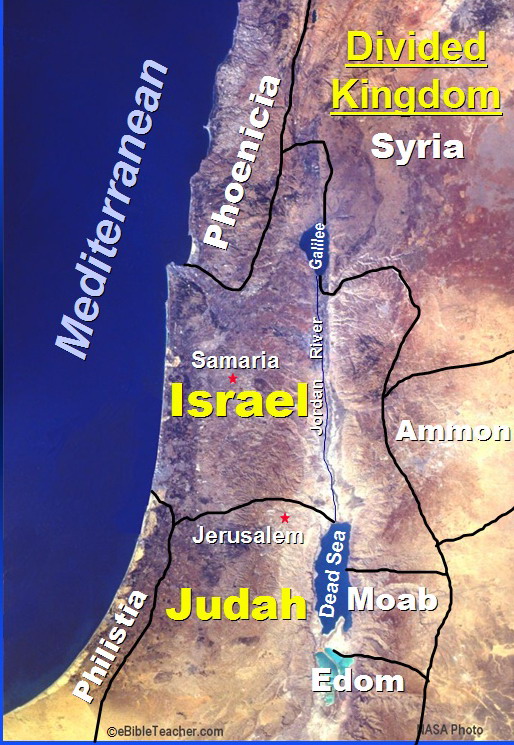Chapter Five
2-Kings. Chapter 5. Elisha Cures Naaman of Leprosy
SCROLL DOWN\
|
Brit-Am Discussion Group |
Contents by Subject |
Research Revelation Reconciliation Contribute |
|
Site Map Contents in Alphabetical Order |
This Site |
|

|
2 Kings 5
The story related in this chapter tells how a foreign general was healed of leprosy and how Gechazi the disciple of Elisha was afflicted by this same leprosy due to his greed for material reward. The overall theme is the power of the Almighty and HIS relation with Israel. God does miracles for other peoples for the sake of Israel and in order that Israel may recognize HIS might! ("Olam HaTanaach" on 2-Kings).
[2-Kings 5:1] Now Naaman, commander of the army of the king of Syria, was a great and honorable man in the eyes of his master, because by him the LORD had given victory to Syria. He was also a mighty man of valor, but a leper.
Naaman in Hebrew means "Pleasant Person". A related name is "Naama". Naaman (according to "Olam HaTanaach" on Isaiah) was also another name for Tammuz and Baal.
Syria in Hebrew is Aram and in Biblical Times was an entity that stretched to the north and east of modern Syria. Present-day Syria at times was ruled by "Aram" and at times by Israel. In Hebrew the names for present-day Syria are Gilead and Bashan. All of Syria in effect is part of the Promised Land of Israel.
but a leper. Leprosy in Biblical Terms is probably the same illness known as Hansen's Disease or leprosy today. Other sicknesses may also have been involved. There were and are different types of leprosy. Some types are quite contagious whereas others are relatively safe. Bearers of leprosy in Biblical terms were considered "impure", needed to be periodically examined and quarantined.
[2-Kings 5:2] And the Syrians had gone out on raids, and had brought back captive a young girl from the land of Israel. She waited on Naamans wife.
a young girl: In Hebrew "naarah katanah". Naarah is usually taken to imply someone in her adolescence though it could have other applications. "Katanah" means "little" or "young". Here we have a "little girl" contrasted to Naaaman who was considered "a great and honorable man".
[2-Kings 5:3] Then she said to her mistress, If only my master were with the prophet who is in Samaria! For he would heal him of his leprosy.
We find here that the young Israelite girl was speaking in a matter-of-fact manner about the healing abilities of the Prophet Elisha. In other words, Elisha must have already healed many people. His healing abilities were well-known in Israel and taken for granted. There was no doubt about them. It is almost as if the Israelites at that time had no need of doctors or hospitals. They simply went to the Prophet.
[2-Kings 5:4] And Naaman went in and told his master, saying, Thus and thus said the girl who is from the land of Israel.
She was only a little girl, a captive, yet she is spoken and related to as someone with innate importance. Her report is believed with little further ado. It is as if having come from the Land of Israel added to her status. She in her own right however must have had an impressive personality to be taken so seriously.
[2-Kings 5:5] Then the king of Syria said, Go now, and I will send a letter to the king of Israel.
So he departed and took with him ten talents of silver, six thousand shekels of gold, and ten changes of clothing.
a letter. In Hebrew "sefer" meaning literally "book" but applied to anything of importance applied in writing. Most writing in those times seems to have been done on papyrus which is made out of reeds or on the skins of animals. Neither of these materials last long in a mildly wet climate which is why hardly any written remnants from Israel or Syria are extant today.
[2-Kings 5:6] Then he brought the letter to the king of Israel, which said,
Now be advised, when this letter comes to you, that I have sent Naaman my servant to you, that you may heal him of his leprosy.
[2-Kings 5:7] And it happened, when the king of Israel read the letter, that he tore his clothes and said, Am I God, to kill and make alive, that this man sends a man to me to heal him of his leprosy? Therefore please consider, and see how he seeks a quarrel with me.
[2-Kings 5:8] So it was, when Elisha the man of God heard that the king of Israel had torn his clothes, that he sent to the king, saying, Why have you torn your clothes? Please let him come to me, and he shall know that there is a prophet in Israel.
[2-Kings 5:9] Then Naaman went with his horses and chariot, and he stood at the door of Elishas house.
[2-Kings 5:10] And Elisha sent a messenger to him, saying, Go and wash in the Jordan seven times, and your flesh shall be restored to you, and you shall be clean.
[2-Kings 5:11] But Naaman became furious, and went away and said, Indeed, I said to myself, He will surely come out to me, and stand and call on the name of the LORD his God, and wave his hand over the place, and heal the leprosy.
Similar events have probably happened to most of us so we can sympathize with Naaman. Ever had a problem and needed medical or legal attention or something similar? For you this may be a letter of almost life and death but when you bring it before the expert he hardly considers it worth his attention and proposes some solution of almost ridiculous simplicity.
[2-Kings 5:12] Are not the Abanah [Amanah] and the Pharpar, the rivers of Damascus, better than all the waters of Israel? Could I not wash in them and be clean? So he turned and went away in a rage.
The word "Abanah" is traditionally read "Amanah" as may be noted in Hebrew printed editions of the Bible. These are rare occurrences in Scripture but they do exist and there is a reason for them.
Amanaa and Pharpar are identified with confluents of the Barada River near present-day Damascus.
Brit-Am (in the light of earlier researchers) says that the Biblical Damascus was in the region of south-east Turkey.
See:
"Brit-Am Now"- 402
#3. The NORTHERN BORDERS of Biblical Israel
http://www.britam.org/now/now402.html




